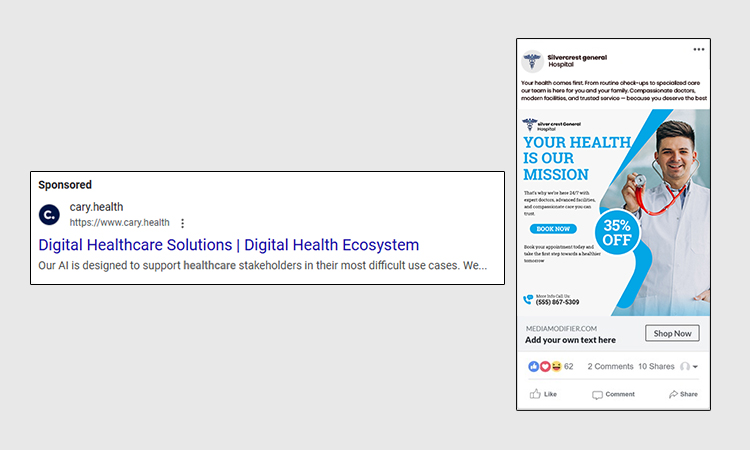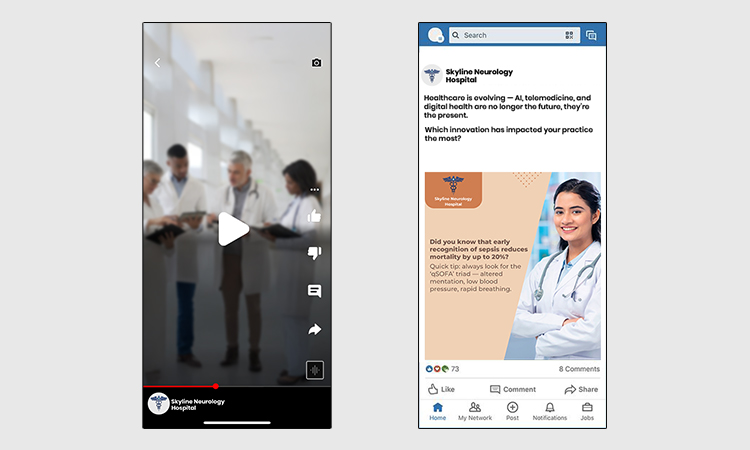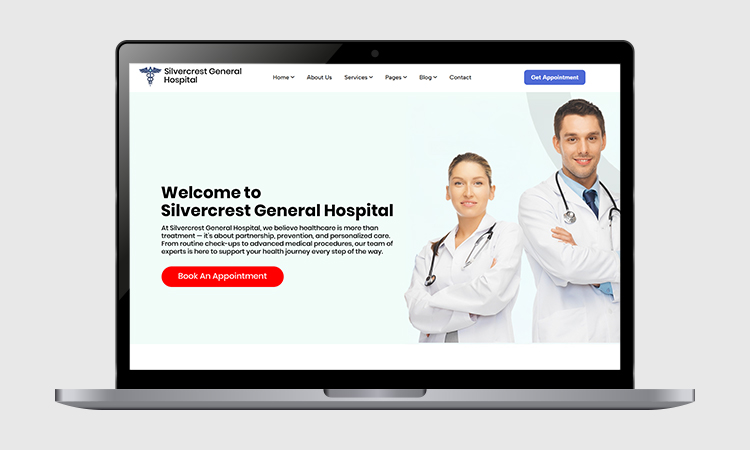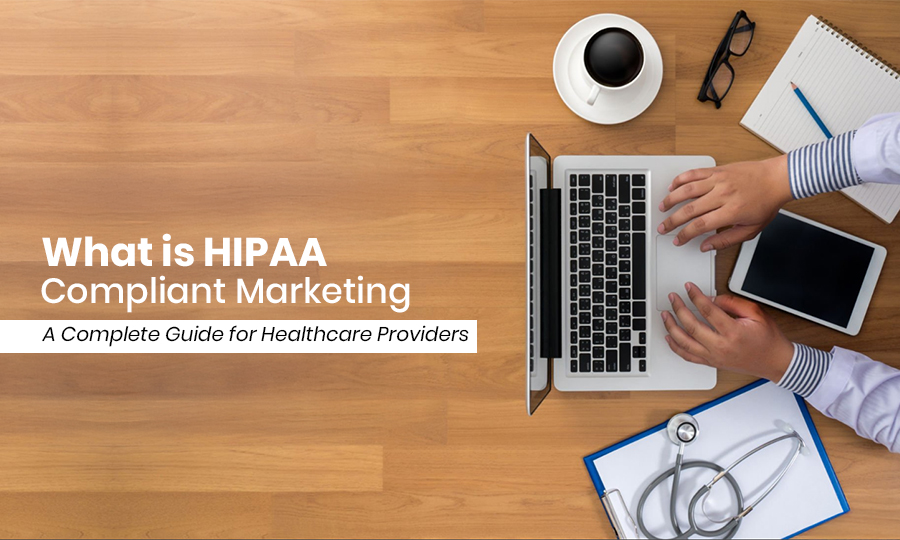Like any other sector, the healthcare sector is also evolving digitally. Healthcare businesses can promote their services and treatments online to stand out from their competitors and engage more target audiences. However, strict limitations on the usage of patient data can complicate the perfect equilibrium between solid data protection and effective healthcare marketing approaches. This is where HIPAA-compliant marketing comes into play.
This marketing type represents an evolution from traditional methods, allowing healthcare organizations to balance legal responsibilities with their healthcare marketing goals
strategically. Do you know, hospitals account for 30% of all data breaches? So healthcare practices must make sure to market their services or treatments online while adhering to strict HIPAA guidelines.
If you are someone who is struggling to maintain the right balance between your marketing objectives and legal obligations, then this blog is for you. It will provide a clear understanding of HIPAA guidelines, including HIPAA compliance checklists tailored to the healthcare sector, as well as tools that healthcare experts can implement to promote their business while adhering to HIPAA regulations.
What is HIPAA Compliant Marketing
HIPAA-compliant healthcare marketing is the process of strictly adhering to the Health Insurance Portability and Accountability Act when leveraging patient information for promotional purposes.
HIPAA-compliant marketing guarantees patient privacy and data security while helping healthcare providers to reach their prospective patients. This includes careful handling of Protected Health Information (PHI), obtaining prior patient consent, and incorporating relevant security measures to protect sensitive data.
Understanding HIPAA Guidelines for Marketing in the Healthcare Sector
HIPAA guideline regulates how healthcare providers can leverage PHI for marketing purposes. Fundamentally, any activity that involves PHI, such as using patient data to promote a service or treatment, requires prior consent in written format from the patient. This is especially designed to safeguard patient privacy and confidentiality.
For healthcare businesses and marketers, this means:
- PHI Protection: If marketing efforts require patient data such as names, email addresses, and medical records, they must meet HIPAA standards. This includes limited access, safe storage, and encryption to prevent unauthorized access to patient information.
- Prior consent from patients: Organizations that offer health-related services must obtain prior consent from patients before they use PHI for promotional activities. This guarantees transparency and gives patients authority over their information.
- Third-party compliance: In case a healthcare organization leverages email platforms, advertising tools, or Customer Relationship Management (CRM) systems, that organization must also adhere to the HIPAA regulations. They need to make sure they have signed Business Associate Agreement (BAA) before dealing with patient data.
Do you know, HIPAA violations are costly, costing over $2 million per accident? If a healthcare business fails to comply with the HIPAA guidelines, it can lead to severe penalties, fines, and reputational damage. On the other hand, businesses that prioritize HIPAA compliance can effectively engage with their patients while safeguarding their personal information.
Who Needs to Be HIPAA Compliant
HIPAA regulations apply to healthcare providers, healthcare clearinghouses, and health plans, as they are considered “Covered Entities” under the law. Business Associates who work with these organizations and deal with sensitive patient data must also adhere to HIPAA guidelines.
- Covered Entities
- Healthcare Providers: Any medical or healthcare service provider or supplier that transfers any health information electronically. This includes businesses such as hospitals, clinics, doctors, physicians, dentists, and other practitioners.It also includes organizations and individuals who are associated with furnishing, billing, or paying for healthcare services in the normal course of business.
- Health Clearinghouses: Entities that handle nonstandard health information received from another entity into a standard format or vice versa. These types of organizations include billing services, community health management information systems, value-added networks, and repricing companies.
- Health Plans: This category includes health insurance companies, business health plans, HMOs, and government programs that reimburse for healthcare, such as Medicaid, Medicare, the Military, and Veterans health programs.This includes prescription drug insurers or medical services, including church-sponsored or government employers.
- Business Associates
A business associate is an organization or business that executes certain activities for covered entities or offers services to them, which involves the usage or disclosure of PHI. For instance, quality assurance, billing, legal, accounting, or consultation services.
The connection between a Covered Entity and Business Associate must be managed by a Business Associate Agreement (BAA). This is a written contract that specifies how the Business Associate must protect PHI, restricts the usage and disclosure of PHI by the Business Associate, and requires them to incorporate safety measures that comply with the HIPAA Security Rules.
A Business Associate Agreement is crucial to guarantee that any analytics partner or marketing businesses that are dealing with PHI on their behalf strictly adhere to HIPAA’s requirements.
Why Marketers Need to Care?
If a marketing agency working with a healthcare provider deals with PHI, they must comply with HIPAA regulations. For successful HIPAA-compliant marketing, healthcare providers must incorporate necessary safety measures such as encryption, train their teams on HIPAA policies, and secure access controls.
Marketing experts or agencies must also enter into a Business Associate Agreement with covered entities to guarantee compliance.
Common Healthcare Marketing Activities That Need HIPAA Compliance
Common healthcare marketing activities that need to comply with HIPAA regulations include emails, social media marketing campaigns, SMS marketing, paid advertising, and more. Here is a complete list of some of the healthcare marketing activities that need to strictly follow HIPAA guidelines.
- Email Marketing Campaigns

Nowadays, email marketing has emerged as one of the most effective ways to engage with patients, but only when done correctly. One of the biggest challenges of email marketing is maintaining a balance between personalization and HIPAA compliance.
So, healthcare organizations need to focus on secure and permission- based patient outreach in order to build trust without risking violations of sensitive data. To send HIPAA-compliant emails to patients, healthcare organizations must follow these steps.
- Secure PHI
Before sending any email marketing communications, healthcare organizations must make sure to obtain prior consent from their patients.
- Seek Approval From Patients
Healthcare organizations must avoid using PHI in email subject lines or body content. Instead, they should use generic health topics.
- Ensure Proper Encryption
You must encrypt emails that contain sensitive information and guide patients to a safe and secure portal when discussing personal health concerns with them.
- Select the Right Email Provider
Healthcare organizations or specialists must make sure to choose a healthcare provider that has signed a Business Associate Agreement, showcasing that they strictly adhere to HIPAA guidelines. In case you are just starting out and finding it too difficult to proceed with the process, you can perhaps partner with an email marketing expert.
- SMS Marketing

If not managed right, texting and HIPAA can become incompatible. Text messaging is a great way to send appointment reminders, health tips, and surveys to patients.
However, sending sensitive data through unencrypted channels can lead to data violations. Here are some best practices for sending text messages to your patients.
- Healthcare organizations must make sure to leverage HIPAA-compliant SMS platforms that encode communications.
- Similar to email marketing, SMS marketing also requires taking prior consent from patients. So, make sure to obtain consent from patients before using any PHI.
- Organizations such as hospitals and clinics must avoid sharing any kind of diagnostic information through texts.
- Paid Advertising

Commonly used paid media platforms such as Facebook, Google, Instagram, or X do not comply with HIPAA regulations. However, healthcare organizations can still use these platforms, but with proper precautions by avoiding the disclosure of PHI.
You must avoid using advanced audience targeting options on these platforms, but what you can do is you can create audience segments by leveraging basic and non-identifying demographic options.
Here are some precautions healthcare organizations must take when advertising with paid media.
- Avoid Using PHI in Ads
Healthcare organizations must make sure not to disclose any PHI, such as names, photos, or treatment details, or any other identifiers of patients in their ads.
- Get Written Authorization
Obtaining written authorization from patients is crucial in case any healthcare organization is using images, videos, or other sensitive patient data for advertising purposes.
- Leverage Broad Targeting
To avoid the risks of PHI disclosure, healthcare organizations must focus on basic demographic data and non-identifiable audience segments, rather than focusing on advanced targeting options like look-alike audiences or retargeting.
- De-identify Data
Before sending any patient data to ad platforms, healthcare businesses must make sure to remove all identifiers and any information that could identify an individual.
- Prioritize HIPAA-compliant Platforms
While platforms such as Google and Facebook Ads are not HIPAA-compliant tools, healthcare providers can use them, but with extreme caution by following the above-mentioned rules. If you are still unsure of how to set up HIPAA-compliant ads, you can seek help from a professional PPC expert.
- Social Media Marketing

With over half of the population using social media, it has become a powerful tool for healthcare marketing.
Platforms such as Instagram, Facebook, LinkedIn, TikTok, and YouTube offer unique opportunities for healthcare providers to connect with their audiences while ensuring HIPAA compliance.
By personalizing their approach for each platform while ensuring strict compliance measures, healthcare businesses can not only reach the right patients but also foster higher patient engagement.
- LinkedIn: On this platform, healthcare specialists and practices can share educational content, case studies, and industry research without disclosing any sensitive data.
- TikTok: TikTok has emerged as one of the most preferred platforms for sharing short-form video content, making it a great platform for creating interactive videos on wellness tips and common medical conditions without including information about any specific patients.
- YouTube Shorts: For effective HIPAA-compliant marketing, YouTube Shorts is yet another exceptional platform that can be used by healthcare providers to share both long-form as well as short-form videos to educate their patients on various healthcare topics. Short-form videos can discuss treatment or product overviews, behind-the-scenes into medical practices, or common health myths. These quick and simple tips can help engage more audience in a HIPAA-compliant manner.
To help healthcare practices leverage social media marketing while complying with HIPAA regulations, this section of the blog will discuss some of the crucial steps to follow.
- Focus on General Information
Healthcare providers must avoid using any kind of personal information of their patients when uploading videos or images on social media platforms. Rather, they should share general health tips, public health awareness campaigns, and preventive care measures that do not include personal information of patients.
- De-Identify Sensitive Data
In case it is necessary to share patient information, healthcare providers must make sure it is completely de-identified. That is removing any personal details that could reasonably identify a particular individual.
- Obtain Explicit Patient Consent
For any testimonial videos or stories, healthcare providers must secure prior written authorization detailing how the data will be utilized.
- Use Disclaimers
Healthcare organizations should display disclaimers prominently on their profiles as well as in direct messages to remind users not to share any PHI.
Finding all of this a little too overwhelming, you can simply seek professional social media marketing services.
- Content Marketing

This is another important digital marketing strategy that must follow HIPAA regulations. To use content marketing compliantly under HIPAA, here are some tips for healthcare providers to do so.
- Healthcare businesses must develop high-value content that does not require the implementation of any PHI. Contents such as blog posts and articles on general health topics, videos on treatment procedures, and infographics on prevention care do not need any sensitive patient data.
- Make sure that content, such as video testimonials and case studies that require PHI, is either entirely de-identified according to HIPAA standards or is used only after obtaining consent or written authorization that clearly mentions its use in marketing activities.
- When developing interactive elements such as quizzes on your website, healthcare specialists must make sure that those do not accidentally collect PHI without proper consent mechanisms. If you need further assistance with the steps to develop HIPAA-compliant content, you can perhaps hire a content marketing agency.
- Website and Lead Forms

The website of a healthcare organization is the first touchpoint for patients who are looking for healthcare services. This makes it a crucial aspect of a HIPAA-compliant marketing strategy.
A well-optimized website must not only offer every little detail of a business but also should be engaging enough to attract more patients, without the use of any sensitive information.
If a healthcare organization collects, stores, or transmits sensitive patient data such as their names, email addresses, or contact details, it must meet HIPAA standards. This implies that encryption, safe storage, and access controls are crucial. Here are certain things that a HIPAA-compliant website must possess.
- SSL encryption
Every healthcare practice must utilize an SSL certificate to ensure that data is properly encrypted during transmission. Patients should see HTTPS in the URL, indicating a secure connection.
- Business Associate Agreement (BAA)
Any third-party service that deals with patient inquiries, such as email marketing tools and chat software, must sign a BAA. This will confirm that they meet the highest HIPAA security standards.
- Secure Chatbots and Web Forms
Any live chat features, contact forms, or appointment request tools must encrypt data and store it safely on a HIPAA-compliant server.
Note: Web forms such as Google Forms are not HIPAA-compliant.
HIPAA Compliance Checklist for Healthcare Marketing
A HIPAA-compliance checklist for healthcare marketing guarantees that they handle PHI properly by getting written authorization from patients, signing a BAA, and more. This section of the blog will provide a complete list of HIPAA compliance for healthcare businesses.
- Obtain Written Patient Authorization before Using PHI
Before using PHI for promotional purposes, healthcare providers need to get written authorization from patients. The authorization should be stored safely for audit purposes.
- Ensure All Vendors Sign a BAA
Any third-party vendors, including agencies and platforms handling PHI, must sign a Business Associate Agreement with your healthcare organization, showcasing they are committed to safeguarding sensitive patient information.
- Encrypt All Digital Communication that May Include PHI
Healthcare organizations need to implement solid encryption for every digital platform, including SMS, emails, and advertising platforms that could contain PHI, to prevent unauthorized access both when stored and transmitted.
- Leverage Secure Marketing Tools and Platforms
In order to safeguard crucial patient data, healthcare providers must choose and implement tools that have built-in security features and are designed to be HIPAA-compliant.
- Guarantee Constant Compliance with Regular Audits
Healthcare organizations need to conduct regular and thorough self-audits or gap analyses to determine vulnerabilities and guarantee ongoing compliance with HIPAA regulations.
- Include Opt Out Options
You must offer clear and accessible unsubscribe or opt-out links in all of your marketing communications to offer patients control over their communication choices.
- Ensure Data Minimization
Healthcare businesses must collect only the minimum amount of data that is necessary for marketing analytics and data visualization activities to minimize the risks of disclosure.
- Provide Regular Training to Your Staff
50% of businesses say that they test employees on HIPAA training at least annually. To avoid data breaches or data violation risks, you should also educate or train your staff and team on HIPAA regulations and best practices to maintain high standards of compliance.
Tools for HIPAA-Compliant Healthcare Marketing
HIPAA-compliant marketing tools include specialized email and CRM platforms such as Salesforce Marketing Cloud and Paubox. These tools offer features such as data encryption, audit trails, and strong access controls to safeguard patient data.
Here is a detailed guide to all the HIPAA-compliant tools that healthcare businesses can leverage.
- Email Marketing Tools:
- Paubox
It is a great HIPAA-compliant platform for the healthcare sector that offers personalized email campaigns with safe storage and analytics solutions.
By using this platform, email marketers can leverage a simple drag-and-drop email builder, pre-established layouts, or even their own HTML. This tool allows for customizable text so that emailers can safely include sensitive data such as patient names, medications, and medical conditions, while strictly following HIPAA regulations.
By implementing this tool, marketers can create automated email sequences and segment the audience. All emails that are sent are automatically encrypted for effortless HIPAA compliance.
Steps to implement Paubox:
- As the first step to implement this tool, you need to navigate to Paubox. If you already have a website, you can simply “Sign in.” If you don’t have an account, choose “Sign up.”
- After that, you need to enter basic information to get started.
- In the next step, you need to activate your domain. This domain should be the one that you will be using to send emails with the API. To do this, log in to the Admin Panel> click on “Reset API”> and then hit the “Add new domain” button.
- You need to add your domain name and validate it by updating the DNS records.
- After that, click on the “Settings” icon and then “Manage Domain.”
- Healthcare businesses can include a TXT or CNAME record in their domain’s DNS settings to verify it.
- Then add the information, come back to this page, and click on “Check now.”
- The verification might either take time between 24-48 hours or happen immediately, depending on your DNS host.
- After you are done with verifying your domain, you need to generate your API key.
- To do this, click on “Settings” and then “Manage domain.”
- To connect and safely send emails, it is crucial to use the API key and your patient endpoint.
- LuxSci
This offers exceptional HIPAA-compliant marketing automation and email marketing software to effectively manage patient communications and campaigns while safeguarding PHI.
To leverage Luxsci successfully, first, healthcare businesses need to sign a BAA with them and conduct a thorough risk analysis to determine potential vulnerabilities for your PHI.
The Secure Email Gateway service of this tool automatically applies all end-to-end encryption to every email that contains sensitive patient information, ensuring safe communication with patients and other entities.
This tool is especially designed to be integrated without disrupting your present email system and user experience, making it easier for healthcare businesses to achieve compliance.
CRM Tools:
- Salesforce Health Cloud
It is an enterprise-level CRM that is especially made for large-scale healthcare organizations. It offers advanced features such as BI, workflow automation, and EHR Integration.
Steps to Set up Salesforce Health Cloud
- To get started with Salesforce Health, you need to navigate to Salesforce Health Cloud and then go to “Account Settings” and verify that the “Contacts to Multiple Accounts” is enabled in your Salesforce org.
- Healthcare practices then have to install the Health Cloud Package. To do this, you need to paste the installation link from the “Terms and Conditions” section of your contract into the address bar of your browser and hit “Enter.”
- After that, healthcare businesses need to log in as a system administrator and click on “Install.”
- When you are done with installing the Health Cloud package, healthcare providers need to set up their organization.
- To do this, they need to set up “My Domain” and wait for some time for the domain to register and navigate to “Users.”
- After that, they need to assign default page layouts, record types, and permission sets to your system administrator profile. Ensure that you are a Service Cloud User in order to access the “Health Cloud Console.”
- Now you need to be prepared to manage the different “Users” who make up the Health Cloud. This consists of Health Cloud Admins, patients, care coordinators, internal Salesforce Users, and care community members.
- After this, you need to personalize the Health Cloud Console. Salesforce Health Cloud has given you access to edit the key components and attributes that you will need to make to make your instance of Health Cloud suitable for your business’s needs.
- As the final step, healthcare providers need to migrate their patient data. Patient creation includes two processes: A job flow that creates the patients, and a mapping group that maps data from the Candidate Patient object to a different patient object. The settings that manage these processes are available for customization so that you can track how data mapping and patient creation occur in your organization.
- Caspio
This tool offers an exceptional HIPAA-compliant healthcare CRM solution that helps healthcare professionals and organizations with a low-code development program. It has features such as secure storage, data management, and application development.
Caspio offers a user-friendly interface and solid tools to help healthcare organizations and professionals build custom applications, simplify data management, and improve the overall operational performance in the healthcare sector.
HIPAA-Compliant Web Form Tools
Tools such as Jotform and Formstack offer HIPAA-compliant form solutions. Formstack offers great customization options and integrations that are suitable for large-scale healthcare organizations. On the other hand, Jotform is a user-friendly option for small-scale healthcare practices that are looking for easier solutions.
- Jotform
Jotform’s HIPAA-compliant version is a great platform that helps small-scale healthcare businesses develop HIPAA-compliant web forms. It includes robust features, including file uploads, eSignatures, SSL encryption, and a mobile-friendly design.
Furthermore, this platform can integrate perfectly with other third-party tools, such as Google Sheets and Calendar, and enables patients to submit their data securely.
Jotform can be used for HIPAA-compliant marketing only if users purchase the Gold or Enterprise levels of the plan and sign a Business Associate Agreement (BAA). This tool offers automatic encryption for HIPAA-compliant forms.
Steps to Use Jotform’s Web Forms
- Firstly, healthcare businesses must navigate to the Joform website and sign up for free.
- They need to update their plan to the Gold or Enterprise as HIPAA compliance is not available on free plans.
- To do this, log in to your Jotform account and go to the “My Forms” section.
- After that, healthcare businesses must click on their profile icon and hit “Settings.”
- In the settings menu, healthcare providers must go to the Data tab.
- And then click on the “Enable HIPAA compliance” or ”Start Migration” button to start the automated process.
- During the process, Jotform will scan your existing forms and then transfer them to a HIPAA-friendly environment.
- If any form elements, such as payment processors or certain widgets, are not HIPAA compliant, Jotform identifies them. Then healthcare providers ned to remove them or update these non-compliant elements on the affected forms.
- When the migration process is completed, Jotform will redirect you to the Data page to sign the Business Associate Agreement (BAA).
- When redirected, you need to click on the “Sign BAA” button, fill in the required data, and click on “Submit.”
- After completing the process, healthcare businesses will receive an email and then can view as well as download the BAA form from the data page.
- In the final step, your account and forms will be enabled for HIPAA compliance, and a compliance badge will be added.
- Formstack
It is a cloud-based productivity platform that offers document signing and form creation options. However, here is a catch. Healthcare businesses cannot enable HIPAA compliance if they do not upgrade their plans to the Enterprise level.
Formstack’s web forms can be used for HIPAA compliance and have multiple complex and interesting features, such as electronic signature collection, Section 508-compliant forms for users with disabilities, and mobile-friendly options.
Steps to Use Formstack for HIPAA-compliant Web Forms
- To use Formstack, first, healthcare providers need to make sure they have a dedicated Formstack account.
- Formstack requires a specific healthcare account to support HIPAA compliance, as it involves modern security features and options that are not available in standard accounts.
- Then you need to sign a BAA to confirm that both parties adhere to HIPAA regulations when sharing PHI.
- Next, healthcare providers need to create their web forms using the Drag-and-drop builder from Formstack. This includes selecting relevant fields for the sensitive patient data you need to collect.
- Now you need to go to the “Settings” section and then “Security” in order to access advanced security features.
- Enable data encryption: Enabling data encryption is very important for protecting the database that contains sensitive patient information.
- Use strong passwords: This requires users to create and use robust passwords to access forms from their accounts and avoid disclosure or unauthorized access.
- Shorten timeout settings: Healthcare organizations need to limit the time users can be inactive in order to prevent unauthorized access to their sessions.
- Healthcare businesses must implement two-factor authentication by requiring users to enter a specific code from their mobile devices after entering the password.
- You need to use PGP (Pretty Good Privacy) to encrypt notification emails that are sent from your Formstack account. This will ensure that all the PHI is secured even during transmission.
Hosting Tools: HIPAA-compliant web hosts
For successful HIPAA-compliant marketing, healthcare organizations must consider web hosting providers such as Atlantic.Net, Microsoft Azure, Amazon Web Services, and Rackspace. Here is a more detailed breakdown of some of the popularly known hosting tools that are HIPAA-compliant.
- Atlantic.Net
This web hosting tool specializes in HIPAA-cloud hosting that offers transparent compliance documentation and flexible setup options.
Atlantic.Net offers quick provisioning and has years of expertise in healthcare IT. This platform offers advanced features, including HIPAA-compliant cloud servers, SSL, encrypted VPNs, backup, and disaster recovery services, and BAAs that are provided by default.
It is a great tool for startups or small-scale healthcare businesses with limited technical resources that still need to strictly comply with HIPAA guidelines.
- Microsoft Azure
This is a suitable web hosting platform for enterprise-level businesses and those who have loads of Electronic Health Record (EHR) needs. Microsoft Azure delivers cloud hosting with strict HIPAA compliance support, global reach, and integration across the Microsoft ecosystem.
Some of the best features this web hosting platform offers are HIPAA-eligible services (e.g., Azure SQL), a compliance manager to prepare audits, and available BAAs through Microsoft Trust Center.
- Amazon Web Services
AWS is an exceptional web hosting tool for enterprise-level and scalable cloud hosting. It offers a HIPAA-compliant environment for healthcare providers that are looking for flexible computing support, compliance, and integrations across global presence.
Amazon Web Services offers features including end-to-end encryption, audit logging, signed BAAs through the AWS artifact portal, and more than 100 HIPAA-eligible services.
- Rackspace
This is another managed cloud hosting provider that offers a HIPAA-compliant environment across Google Cloud, Azure, and AWS. Its advisory approach allows healthcare practices to transmit and maintain compliant workflows.
Rackspace offers some excellent features, including personalized SLAs and disaster recovery, active threat detection and support, and multi-cloud HIPAA hosting options.
This web hosting platform is suitable for teams that are undergoing digital transformation and a CMS migration that need hands-on compliance and expert cloud assistance.
Social Media Management Tools
While most social media management tools lack a Business Associate Agreement (BAA), which is needed for HIPAA compliance, there are some specific ones out there that may support these by offering advanced security features.
In this section of the blog, we will discuss some of the most effective social media management tools that strictly adhere to HIPAA regulations.
- Sendible
While this is not exactly a BAA-compliant tool, Sendible heavily focuses on security by offering advanced features such as secure access controls, encrypted connections, and backups to protect account information.
This extent of security is a positive step for healthcare practices or organizations that deal with highly sensitive patient data and may be a starting point for discussing HIPAA compliance.
- Hootsuite
It is a very effective BAA-compliant social media management tool that offers very useful features that might be much needed for healthcare practices to use social media safely.
Hootsuite enables patients to navigate care and enhance educational initiatives from a single and secure dashboard. Healthcare organizations can make sure all their posts meet their company’s security standards with compliance inetgrations such as Proofpoint, which is multi-layered with approval workflows.
- MarketBeam
This is a one-step solution that can help you manage social media in medtech, pharma, and other related sectors.
MarketBeam is another effective social media platform that focuses on regulatory compliance. This tool offers exceptional features for healthcare organizations, including approval workflows and audit trails for your social media posts to make sure they meet healthcare regulations such as HIPAA.
- SocialClimb
SocialClimb incorporates every necessary safety measure required for HSS and HIPAA regulations.
In comparison to other social media management tools that restrict healthcare information, SocialClimb leverages integrations to eradicate the need for pixels or the exchange of patient information with third-party applications such as Google or Meta.
This tool lets healthcare organizations keep track of their patient journeys while strictly adhering to HIPAA regulations for successful HIPAA-compliant marketing, measure marketing ROI by incorporating healthcare-specific metrics only, and leverage predictive targeting without compromising on patient privacy.
SocialClimb includes a complete range of HIPAA-compliant templates for image and video ads, which allows healthcare businesses to develop high-performing content in just a few minutes without having to worry about compliance issues.
Challenges in HIPAA Compliant Marketing
Patients always look for tailored experiences, like sending reminders, updates on new treatment options, and healthcare tips that are relevant to the treatment they have sought. However, it is not that easy, especially when the topic is healthcare. It definitely is possible, but only if it successfully passes through the strict HIPAA regulations.
So, in this part of the blog, we will discuss some of the major challenges a healthcare organization has to face when promoting its business online while adhering to HIPAA-compliant guidelines.
- Strict Advertising Regulations
HIPAA strictly restricts the use of PHI for ad targeting. Besides, platforms such as Facebook and Google have their own policies when it comes to healthcare advertising.
These platforms also strictly restrict personalized healthcare ad targeting. This makes the audience segmentation process more difficult for healthcare businesses. So, rather than behavioural targeting, healthcare practices must focus on contextual marketing and first-party data.
- Restricted Use of Retargeting and Tracking
Imagine searching for physiotherapy services online, only to see your search results flooded with therapy ads. In the case of other industries, doing this will be identified as tracking and retargeting.
This means showing ads that are only relevant to the user’s search intent. However, in the healthcare industry, this is nothing but a breach of privacy. This is why HIPAA prohibits healthcare businesses from keeping track of their visitors and showing them targeted ads, as there is a high risk of disclosure of sensitive health information.
- Sensitive and Ethical Messaging
Healthcare businesses must make sure to draft messages that are not only empathetic but also ethical. When crafting messages for this industry, you should be smart enough to develop your messages in a way to educates and resolve the queries of your patients, rather than pressuring them to choose your healthcare business.
- High Competition and Oversaturated Market
Healthcare is an emerging sector. And with this rising popularity, the competitiveness in this sector also rises. Healthcare businesses, including hospitals and clinics, are all competing to get the attention of the audience.
In order to stay at the top, healthcare providers need to invest in a lot of crucial resources that can help them achieve the results they desire.
Conclusion
HIPAA-compliant marketing is undeniably important for healthcare providers. However, it comes with a lot of challenges. From safeguarding sensitive patient data in email campaigns to leveraging HIPAA-compliant paid advertising strategies, every touchpoint must prioritize the privacy and security of sensitive patient data.
By incorporating the right tools and practices, such as encrypting communication channels and privacy-conscious marketing strategies, healthcare organizations can not only engage with their patients effectively but also follow the highest standards of HIPAA regulations. In case you are someone who is just starting out and has no idea how to proceed, you can perhaps seek help from a professional healthcare marketing expert.



























